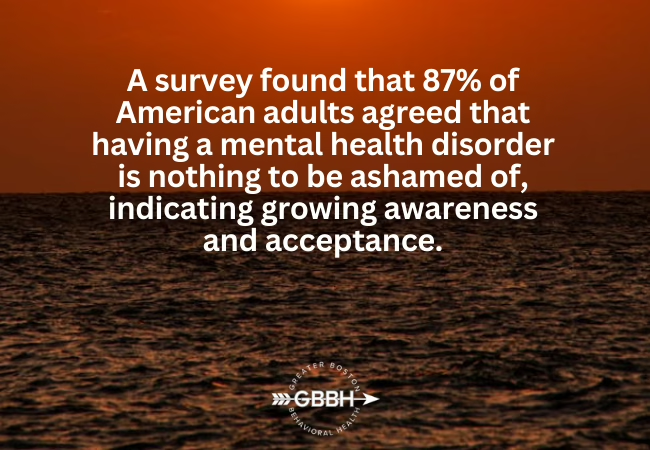Despite the progress made in mental health awareness, stigma still prevents many individuals from seeking the care they need. Society often associates mental health struggles with weakness, instability, or lack of willpower, which can lead to shame, isolation, and reluctance to seek help.
For far too long, mental health has been a taboo subject—something people avoid addressing due to fear, embarrassment, or judgment. But why? If we can openly discuss physical health, why not mental health? The truth is that mental health influences all aspect of our life, including our relationships, employment, dreams, and even our physical health. However, the stigma surrounding it forces too many people to suffer in quiet.
It is time to change that. It’s time to end the stigma, start the conversation, and build a world in which no one feels alone in their challenges. This guide explores why breaking the stigma is crucial, how mental health discussions create positive change, and how professional treatment options like DBT Therapy, CBT Therapy, and Intensive Outpatient Programs can help individuals achieve recovery.
The Weight of Silence
Imagine you have a huge burden on your shoulders, but every time you try to speak up, you are encouraged to “just get over it” or “stay strong.” That is what stigma does: it makes people feel as if their pain is something to hide rather than treat.
This quiet is harmful. It prevents people from getting treatment. It encourages individuals who struggle with depression, anxiety, or any other mental illness to be a personal failure rather than a medical ailment that requires treatment. The more we avoid discussing it, the more people suffer alone. But here’s the truth: mental health issues don’t define a person. They do not make people weak. They make someone human.
Understanding the Impact of Mental Health Stigma
Stigma is a major barrier to mental health care. Many people with mental health conditions hesitate to talk about their struggles due to fear of judgment, discrimination, or misunderstanding.
1. The Consequences of Mental Health Stigma
When people feel ashamed of their mental health challenges, it can lead to:
- Delaying or avoiding treatment, which can worsen symptoms.
- Feeling isolated or unsupported, leading to increased emotional distress.
- Difficulty maintaining relationships or job stability due to untreated conditions.
- A higher risk of self-destructive behaviors, such as substance use or self-harm.
According to the National Institute of Mental Health (NIMH), more than half of adults with mental health conditions do not receive treatment due to stigma and lack of access to care.
2. The Social and Cultural Factors of Stigma
Mental health stigma is often reinforced by societal misconceptions and cultural norms, such as:
- Believing that mental illness is a choice rather than a medical condition.
- Assuming that therapy or medication is only for people with severe mental illness.
- Fearing that discussing mental health issues will lead to discrimination in the workplace or community.
By challenging these beliefs, we can create an inclusive and supportive culture where seeking help is encouraged.
Why Discussing Mental Health is Important?
1. It normalizes seeking help
If we freely discuss mental health, people will feel less isolated in their challenges. They’ll understand that therapy, medication, or seeking help isn’t anything to be embarrassed of—it’s a step toward recovery. We should feel comfortable getting mental health treatment, just as we would seek medical attention for a broken bone.
2. It breaks generational patterns
Many of us grew up in homes where mental health was not mentioned. Feelings were swept under the rug, and difficulties were viewed as shortcomings. By discussing it today, we can affect the future. We teach our children and loved ones that emotions are vital, and that caring for mental health is just as important as physical health.
3. It saves lives
The most tragic effect of quiet is that many believe they have no way out. Suicide is one of the major causes of mortality globally, and stigma plays a significant role in this. When people feel unable to express their emotions, they may assume they have no other options. But when we initiate talks, we remind them that aid is available, that they are valued, and that their lives are important.
4. It promotes compassion and understanding
Mental wellness is not always visible. You never completely understand what someone is going through. By discussing it, we foster an environment of empathy. Instead of passing judgment, we provide support. Instead of disregarding another person’s pain, we listen. This shift in viewpoint has the potential to change and possibly save lives.
How to Be a Part of the Change
- Open up about mental health with your friends, family, and community.
- Listen without passing judgment when someone reveals their difficulties.
- When you come across damaging stereotypes, challenge them.
- Encourage professional help when necessary, just like you would with physical health.
- Support organizations and communities that promote mental health.
- Every discussion is important. Every minute of understanding reduces the stigma.
Ways to Break the Mental Health Stigma
Breaking the stigma requires education, advocacy, and open discussions. Here are practical ways to help normalize conversations about mental health:
1. Educate Yourself and Others
- Learn about common mental health conditions such as anxiety, depression, PTSD, and bipolar disorder.
- Challenge misconceptions about mental health and therapy.
- Share accurate information from trusted sources, such as NIMH or the American Psychological Association.
2. Normalize Therapy and Treatment
Seeking therapy should be seen as a normal part of self-care—just like going to a doctor for a physical condition. Therapy programs, including CBT Therapy and DBT Therapy, can help individuals:
- Develop healthier coping strategies.
- Improve emotional regulation and communication skills.
- Build resilience against stress, anxiety, and depression.
3. Support Loved Ones Struggling with Mental Health
- Listen without judgment when someone shares their struggles.
- Offer emotional support rather than trying to “fix” the problem.
- Encourage professional help through therapy, support groups, or treatment programs.
4. Advocate for Mental Health Awareness in Your Community
- Encourage workplaces and schools to offer mental health resources.
- Participate in mental health awareness events or advocacy groups.
- Use social media to spread positive messages about mental health care.
You Are Not Alone: Join the GBBH Community!
If you’ve ever felt that you had to suffer in quiet, please know that you’re not alone. We offer mental health treatment programs where you may be heard, understood, and supported. At GBBH, we are creating a community where mental health is prioritized. If you or someone you know is struggling, professional treatment can make a life-changing difference.
At Greater Boston Behavioral Health, we offer:
1. Inpatient Treatment Program
- 24/7 supervised care for individuals in crisis.
- Intensive therapy to address acute mental health concerns.
2. Residential Treatment Program
- A structured, long-term care option for individuals needing stability.
- Incorporates CBT Therapy, DBT Therapy, and trauma-informed care.
3. Partial Hospitalization Program (PHP)
- A step-down from inpatient care, providing structured daily therapy.
- Allows individuals to return home in the evenings for family support.
4. Intensive Outpatient Program (IOP)
- Flexible mental health treatment for those balancing work, school, or daily life.
- Focuses on developing coping strategies, emotional regulation, and relapse prevention.
5. Outpatient Therapy Programs
- One-on-one therapy, group therapy, and family therapy sessions.
- Ideal for individuals needing long-term support and maintenance.
Final Thoughts
Mental health is a vital part of overall well-being, and no one should feel ashamed to seek help. By talking about mental health openly, challenging stigma, and encouraging professional care, we can create a more supportive and understanding society.
At Greater Boston Behavioral Health, we provide comprehensive mental health services, including inpatient, outpatient, and therapy programs, to help individuals take control of their mental well-being.
Call (617) 307-3842 today to take the first step toward healing. Together, we can break the stigma and make mental health care accessible for all.
FAQ on Why Talking About Mental Health Matters
Why is mental health stigma a problem?
Mental health stigma prevents many individuals from seeking help due to fear of judgment, misinformation, and social pressure. This can lead to untreated conditions, emotional distress, and difficulty maintaining relationships or employment.
How can talking about mental health help reduce stigma?
Open conversations about mental health:
- Normalize seeking therapy and treatment.
- Encourage early intervention before symptoms worsen.
- Help individuals feel less isolated and more supported.
What are common myths about mental health?
- “Therapy is only for people with severe disorders.” → Reality: Therapy benefits everyone.
- “Mental health struggles are a sign of weakness.” → Reality: Seeking help is a sign of strength.
- “You can just ‘snap out’ of anxiety or depression.” → Reality: Mental health conditions require care, just like physical illnesses.
What are some effective ways to break the stigma?
- Educate yourself and others about mental health conditions.
- Encourage workplaces and schools to offer mental health resources.
- Support loved ones by listening without judgment.
- Seek professional treatment when needed.


